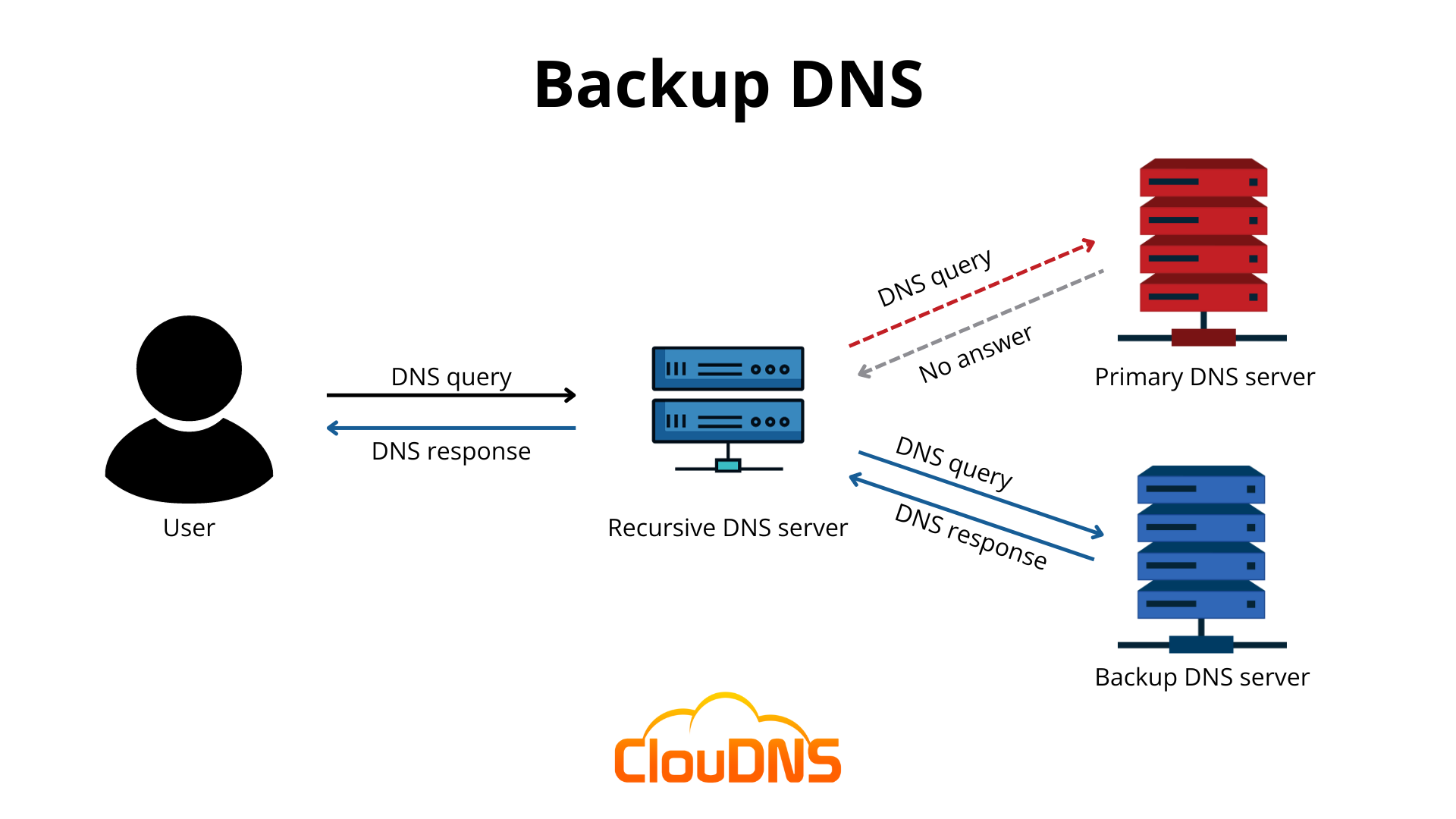Backup DNS is an important part of any website or application infrastructure. It is a system of redundant DNS services that provide availability in the event of any primary DNS service failure. Setting up a robust Backup DNS service is essential for businesses that rely on their website and applications for their livelihood.
Table of Contents
DNS explanation
DNS or Domain Name System is the backbone of the internet. It connects all the users to the content they need. That means it is a directory service which converts human-readable domain names into numerical IP addresses. It is a constant exchange of information, but sometimes the DNS fails and this causes downtime. A blackout period that can be evaded by using a Backup DNS.
Backup DNS
Backup DNS, also known as Secondary DNS or alternative DNS is a system of one or more DNS servers, who have a copy of the zone data (DNS records) of the Master (Primary) DNS server. It adds resilience, reducing the outage periods by answering requests even if the Master is down.
Backup DNS services provide an additional measure of insurance against service outages. They allow a website to remain up and running even if the primary DNS fails, often by serving DNS requests from a different location. Additionally, backups may use the same protocols as primary servers, or be hosted in distributed cloud networks, which increases reliability and performance.
Ready for ultra-fast DNS service? Click to register and see the difference!Experience Industry-Leading DNS Speed with ClouDNS!
How does it work?
Backup DNS works through a few simple steps. Here are they:
- First, when a user requests a website or application, the DNS query is sent to the primary DNS server.
- The primary DNS server then resolves the domain name to the corresponding IP address. But if the master DNS server is down, the request is rerouted to the backup DNS server.
- Then, the backup server resolves the domain name and returns the IP address to the requesting device, allowing access to the website or application.

Benefits of Backup DNS
Backup DNS is an essential part of any website or application infrastructure. The primary benefit of having it is improved website or application availability in the event of any primary DNS service failure. Your website or application will remain up and running even if the primary DNS fails, by redirecting users to a different DNS server.
With a robust Backup DNS service, businesses are better protected from malicious attacks such as Distributed Denial of Service (DDoS) attacks. In addition, for even better safety from these types of cyber threats, there are DDoS Protected DNS services that add another layer of protection.
Backup DNS services can also provide faster DNS lookup times, improved representation of your website or application by serving identical content around the globe, and seamless switching in case of server outages.
Another benefit lies in its scalability. It is designed to scale with any increase in traffic, both in terms of the number of queries handled and the size of the DNS database. As your website or application grows, Backup DNS can help ensure that you don’t lose any traffic simply due to lack of capacity. Additionally, this services often come with built-in features such as failover capabilities, Anycast DNS, and more, which can all improve the overall performance and reliability of your website or application.
What is the worst that can happen? Dyn DNS attack of 2016
Just ask the Dyn DNS users who were victims of the massive DDoS attack of 2016. Many well-known websites and services were affected: Airbnb, Amazon, Twitter, BBC, CNN, Etsy, Github, PayPal, Spotify, and more. Their users were left without service for quite some time. The attackers created a massive amount of traffic that caused the victim’s system to get stuck and eventually crashed. They did that by using an enormous amount of botnets IoT devices (internet of things). There are plenty of connected devices with low protection that can be easily hijacked. The number of such IoT devices is rapidly growing, but their security level is not improving. This means we will have plenty of similar DDoS attacks in the future.
Who needs Backup DNS?
Backup DNS is beneficial for any organization whose website or application is critical to their success, as it adds an extra layer of protection and reliability.
It is particularly important for businesses that serve large amounts of online traffic, such as online retail, media, etc. This is because having a reliable Backup DNS prevents disruption of service and lost revenue.
Additionally, businesses that are subject to malicious attacks, such as governments. banks, healthcare institutions, also benefit from Backup DNS services, as these services can help prevent attackers from overwhelming their primary DNS server.
Additionally, small businesses that are just starting out and may not have the budget of large companies also benefit from this backup service. Why? Because this service is at an affordable price and ClouDNS offers a 30 day free trial for no cost testing. Check out our Secondary DNS service!
Ultimately, Backup DNS is an invaluable tool for organizations of any size.
Conclusion
If you have more DNS servers, working together on a grid, the traffic that comes from such a DDoS attack will distribute between them. Some of your servers may go down for a while, even your master DNS can go down, but thanks to the DNS backup, the rest will continue, and your clients won’t be left without a service.






